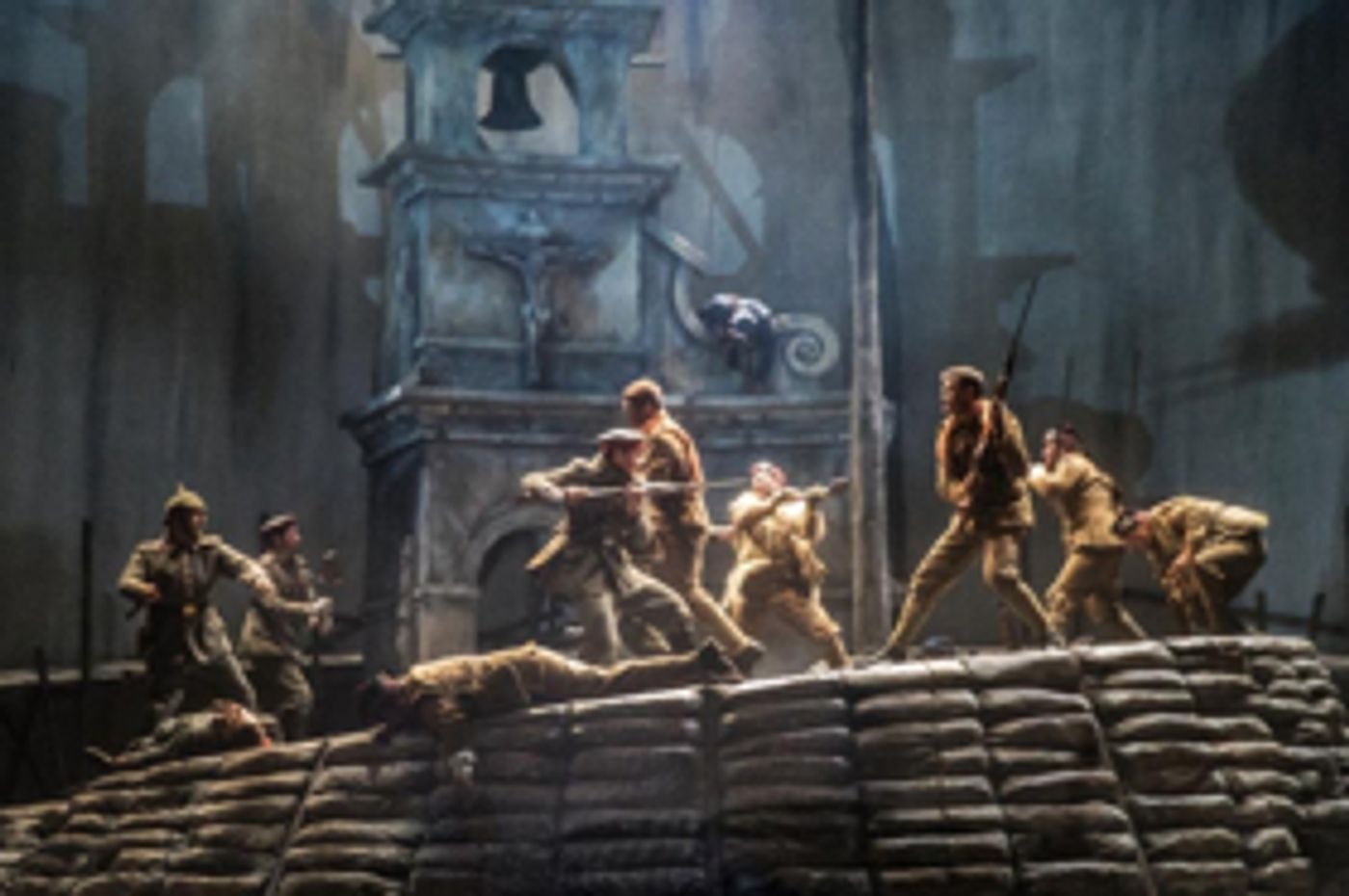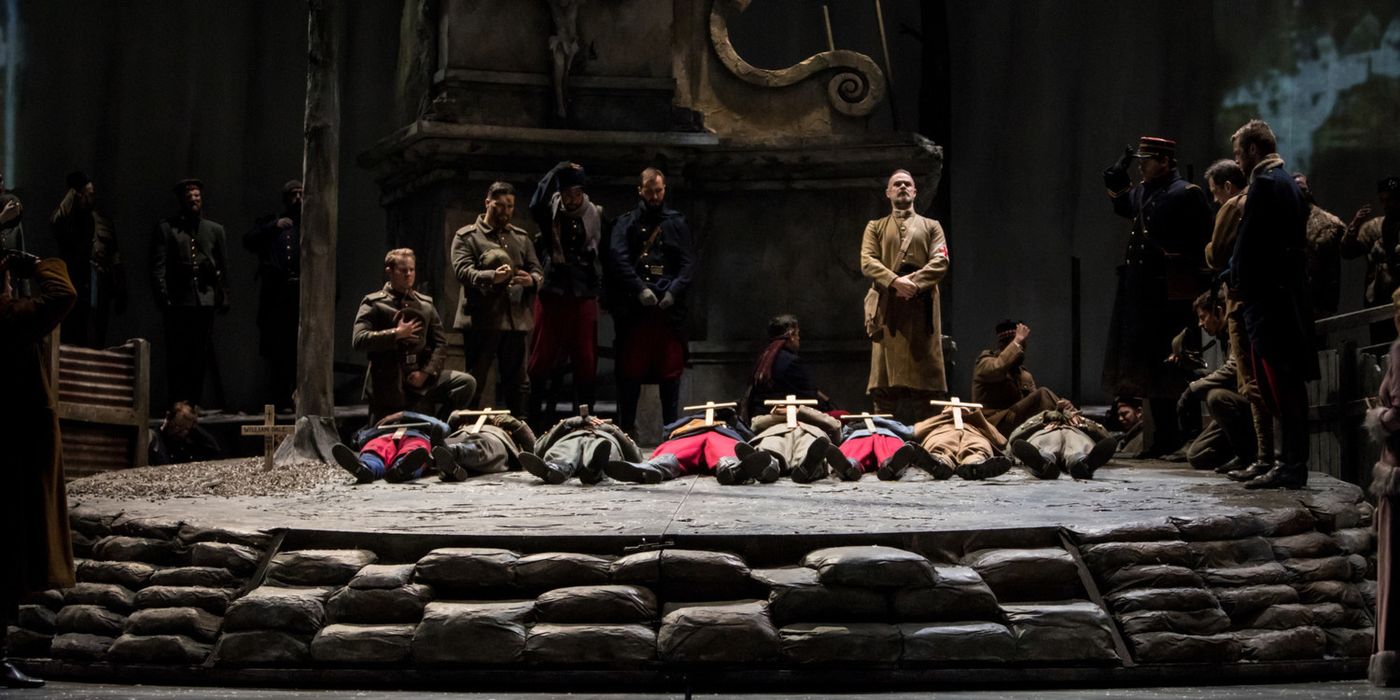BWW Reviews: Minnesota Opera's Pulitzer Prize SILENT NIGHT Profoundly Speaks to Peace on Earth


On opening night for the Minnesota Opera (MNOP), the audience in attendance became curiously quieter and quieter, silent, when the curtain rose at the Ordway Center on the company's contemporary award winning opera "Silent Night." Commissioned by MNOP in 2011, the music by Kevin Puts combined with a libretto by Mark Campbell transported the opera house to Christmas, 1914, the beginning of World War I, Based on Christian Carlson's screenplay for the film "Joyeux Noel," the opera travels to a small, bloodied war zone in a tiny Belgium village along the French boarder, which centers the audiences's attention while profoundly affecting their senses.
For one 24 hour period, Scottish/English and French military companies try to fight back the Germans before they come together for a brief Christmas truce during the December skirmishes. Two brothers from Scotland, a Scottish Priest, two German opera singers where the man has been conscripted into the German military, and a French Lieutenant who needs to leave his pregnant wife all prepare for the battle on the Belgium front along with other soldiers fighting in the fray.
Each of these characters' stories, acted by thirteen amazing opera singers (wish there were lines and space to mention every actor/singer) along with a large ensemble, rotate through the opera' as do the different settings in each camp conceived by Scenic Designer Frances O'Connor. Poignant lighting appears behind the rotating stage, with flashes of cities, landscapes and when appropriate, huge scarlett spatters during the war battles. The audience again quiets when they look at the twinkling lights of one silent night eventually circling behind the stage. Marcus Dilliard, lighting director, and Andrzej Goulding, projections director, master these technical elements while English, French and German subtitles for the opera appear above the stage.
For the audience, several scenes coordinated by Stage Director Eric Simonson and Fight/Assistant Director Doug Scholz-Carlson rivet the audience to the battle scenes where the audience might believe they sit in the trenches watching the action before them in disbelief. The entire opera, each band of soldiers asks several questions during the story-why do we go to war and how can they believe war is anything but absurd and useless? Others contend their country could be "bound for glory."
When the three bands of soldiers decide to hold a Christmas Eve truce, the men reluctantly meet on middle ground in no man's land for a ceasefire. At first tentative, the soldiers eventually realize they are all merely men who wish to live their lives without the devastating carnage World War I-the war to end all wars-brings to them and their families. Together they share pictures and rations in a small moment of peace.
In one heart-rending scene from Christmas Day, the three leaders gather their men to bury all the dead, regardless of nationality, to honor them. The opera singer, Nikolaus Sprink, allows his love and music partner, Anna Sørenson, to travel with him to the front so they can be together after a holiday celebration with German hierarchy. Anna sings for the gathered troops, and to see the line of dead bodies across the stage contrasted with the love between these two opera singers provides a heightened sense of each emotion. Ardent and insightful, love and sorrow bloom anywhere, even on a battlefield where hate hides in another heart of the Scottish brother who lost his sibling on the front lines. The one brother left behind seeks revenge from the others for that lost life.
However, even the German Lt. Horstmayer admits to the French Lt. Audebert his own wife halls from Marseille and is indeed, French. Consequently, in a previous scene, Lt. Audebert sings a emotional love aria to his wife who he hasn't seen in sixth months, Both lieutenants, similar except for the country they live in, remember their families waiting patiently at home. During the time, Scottish bagpipes dignify the small ceremony in the few hours before the truce ends. Although after the burial, Anna laments "Anytime, anywhere in the world, a woman hears a knock at the door with the dreaded news." The ominous sound signals where "dreams unravel and souls are lost."
These sentiments remain as true in 2018 as they did 100 years ago when the final armistice to World War I was signed, 1918, which was recently commemorated in France. Brothers, fathers, husbands, and sons were lost, millions of men, while today women allowed in combat also put their lives at risk. This now includes daughters, mothers, sisters and wives. This opera's powerful message pierces the audience's hearts so even young audience members were shedding a few tears. Perhaps they were remembering someone in their own life who died in the service of their country, whatever country that might be.
While the end of the opera casts a twist to the truce's final minutes, the story fervently asks how do the nations make sure these wars never happen again? Audience members might inadvertently contemplate the French Lieutenant who realizes his wife birthed a son while he's on the front, his name Henri. Little did the Lieutenant realize when his son would be almost 25 years of age, his country would be facing World War II in 1939---and this baby boy could risk losing his life in other excruciating battles.
Evocative and perspicacious, penetrating, as well as visually haunting, Minnesota Opera commissioned and created a timeless contemporary production. A masterpiece the world desperately needs to embrace. At the final curtain, snow falls through a shadowed background while a spotlight shines on a lone cross from one buried soldier. The Scottish Father Palmer prayed at the burial service, "God grant us peace."
While these battered soldiers write home after the Christmas truce that for one moment "they gathered around the cross, as if it was a fire," every audience member might remember the soldiers who gave their lives, and the men and women yet to serve, in the future wars wherever those will unfortunately begin unless humanity rescues their own countries for a different legacy. Audiences might quietly say when leaving the opera on one cold, silent night, to everyone they meet, peace on earth be with you.
Minnesota Opera presents the Pulitzer Prize Wining Silent Night at the Ordway Center, St. Paul, through November 18. For information or tickets to this performance or season, please contact: 612.333.6669 or www.mnopera.org
Reader Reviews
Videos

